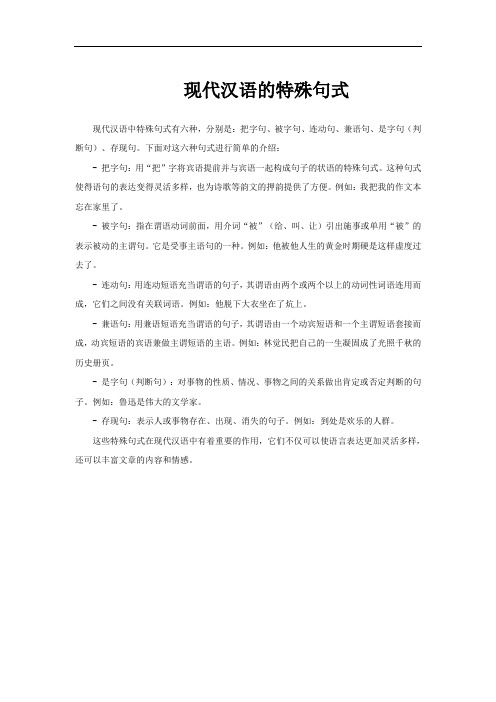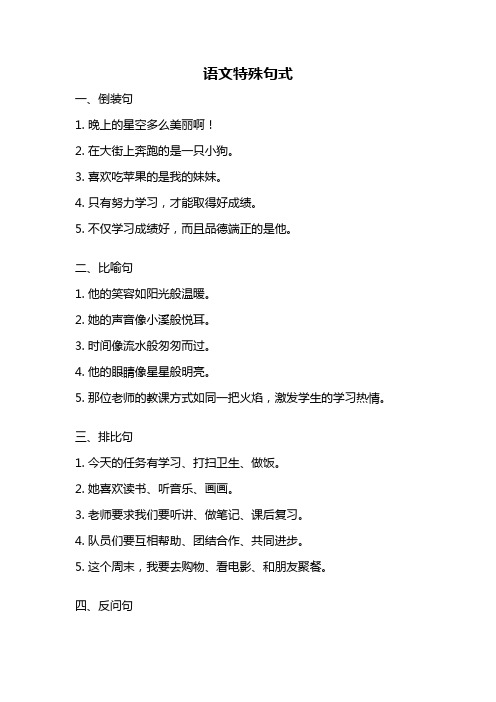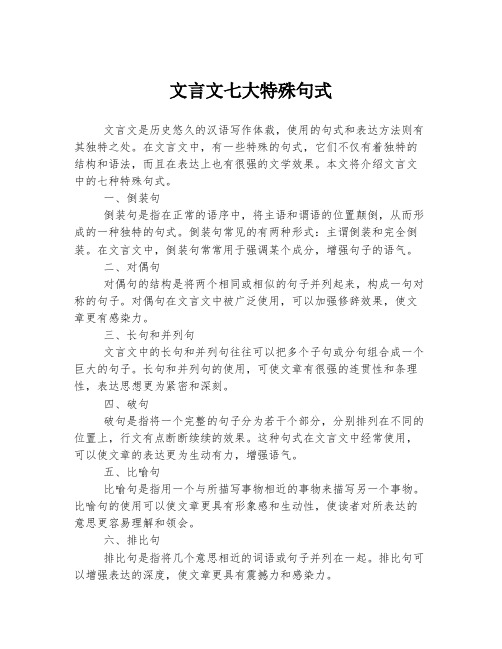特殊句式
现代汉语的特殊句式

现代汉语的特殊句式
现代汉语中特殊句式有六种,分别是:把字句、被字句、连动句、兼语句、是字句(判断句)、存现句。
下面对这六种句式进行简单的介绍:
- 把字句:用“把”字将宾语提前并与宾语一起构成句子的状语的特殊句式。
这种句式使得语句的表达变得灵活多样,也为诗歌等韵文的押韵提供了方便。
例如:我把我的作文本忘在家里了。
- 被字句:指在谓语动词前面,用介词“被”(给、叫、让)引出施事或单用“被”的表示被动的主谓句。
它是受事主语句的一种。
例如:他被他人生的黄金时期硬是这样虚度过去了。
- 连动句:用连动短语充当谓语的句子,其谓语由两个或两个以上的动词性词语连用而成,它们之间没有关联词语。
例如:他脱下大衣坐在了炕上。
- 兼语句:用兼语短语充当谓语的句子,其谓语由一个动宾短语和一个主谓短语套接而成,动宾短语的宾语兼做主谓短语的主语。
例如:林觉民把自己的一生凝固成了光照千秋的历史册页。
- 是字句(判断句):对事物的性质、情况、事物之间的关系做出肯定或否定判断的句子。
例如:鲁迅是伟大的文学家。
- 存现句:表示人或事物存在、出现、消失的句子。
例如:到处是欢乐的人群。
这些特殊句式在现代汉语中有着重要的作用,它们不仅可以使语言表达更加灵活多样,还可以丰富文章的内容和情感。
特殊句式

省略句
1、主语省略
2、宾语省略(包括介词宾语的省略,如例句4、 5)
3、省略介词 文言文中,介词“于”的省略最为常见,有时 也有省略介词“以”的现象 4、省略谓语动词
被动句
• 1、用“于”引进行为的主动者,表示被动 • 2、用“为”、“为所”、“为……所”表示被动 • 例:身死人手,为天下笑者 • 3、用“见”、“见……于……”、“受……于”表示被 动。 • 4、用“被”表示被动 • 5、无被动标志词,但动词有被动意义,翻译时要注意
介词结构后置
• 介词结构:介词+宾语结合的短语
• 介词:于、以、乎等 • “以……”形式的介词结构后置现象中,谓语本 来所带的宾语常常省略。
• 翻译时,要将后置的介词结构还原到动词谓语之 前。
定语后置
1、定语收尾处用“者”字表示 即:中心词+定语+者 2、中心词+之ቤተ መጻሕፍቲ ባይዱ定语(形容词) 3、中心词+数量词
• 翻译时,要将后置的定语还原到它所修饰的中心 语之前。
判断句
1、“……者,……也”;“……者也”;“……,…… 也” 例:一人之心,千万人之心也 2、名词直接充当谓语表示判断 3、用“为”表判断 4、“乃”、“则”、“即”、“皆”等副词常用来加强 判断语气,要翻译成“是”。
宾语前置
1、疑问句+代词作宾语 2、否定句+代词作宾语 3、为强调宾语,在谓语和宾语之间插入助词“之”、 “是”,把宾语提前 即:宾+之/是+谓 4、无标志词 例句:全石以为底;仁义不施而攻守之势异也。 • 翻译宾语前置句要将前置的宾语还原到动词谓语之后
特殊句式

二、特殊句式1、介词结构(状语)后置于+名词/代词:吾佐董丞相于汴州客之美我者,欲有求于我也。
以+名词:虽董之以严刑,振之以威怒。
2、被动句:吾又罢去于:夫赵强而燕弱,而君幸于赵王。
见:秦城恐不可得,徒见欺。
见…于:吾长见笑于大方之家。
被:信而见疑,忠而被谤。
受…于:吾不能举全吴之地,十万之众,受制于人。
为:一夫作难而七庙隳,身死人手,为天下笑者,何也?…为…(之)所:有如此之势而为秦人积威之所劫。
…为所…:不者,若属皆且为所虏无任何标志:由此观之,王之蔽甚矣。
3、省略句:中年兄殁(于)南方汝从(我)于东吾不以(之)一日辍汝而就也未始以(之)为忧也4、断句:东亦客也。
…者,…也:廉颇者,赵之良将也。
…者…:四人者:庐陵萧君圭君玉……者也:沛公之参乘樊哙者也。
……,……也:项脊轩,旧南阁子也。
……为……:如今人方为刀俎,我为鱼肉“乃,即,则,皆,必,本,系,是”等词表判断。
5、宾语前置:疑问代词作宾语:大王来何操。
何以知之否定句中代词作宾语:忌不自信。
古之人不余欺也用“之”“是”提宾:句读之不知夫晋,何厌之有惟兄嫂是依介词宾语是方位名词亚父南向坐。
东面而视为了强调介词的宾语是以区区不能废远一言以蔽之相字解释为偏指一方时会不相从许。
好自相扶将见字偏指一方译为“我”时府吏见丁宁。
慈父见背自解释为“自己”时举贤以自佐6、定语后置……,……者:计未定,求人可使报秦者。
之……者:石之铿然有声者,所在皆是也。
……之……:蚓无爪牙之利,筋骨之强而……者:缙绅而能不易其志者。
特殊句式分类

特殊句式分类
特殊句式有判断句、省略句、被动句、倒装句。
其中,倒装句包括主谓倒装、宾语前置、定语后置、状语后置四类。
特殊句式,就是句子的结构与平常的结构组成存在着区别和不同。
特殊句式
判断句:对客观事物表示肯,构成判断与被判断关系的句子,叫判断句。
省略句:有些句子在一定的语言环境中,省略了句子的某些成分,这种句子叫省略句。
被动句:古汉语中,主语和谓语属于被动式关系的叙述句叫被动句。
倒装句:1.主谓倒装 2.宾语前置 3.定语后置 4.状语后置
状语后置例子
青,取之于蓝,而青于蓝。
况吾与子渔樵于江渚之上。
虽董之以严刑,振之以威怒。
生乎吾前,其闻道也固先乎吾,吾从而师之。
1/ 1。
语文特殊句式

语文特殊句式一、倒装句1. 晚上的星空多么美丽啊!2. 在大街上奔跑的是一只小狗。
3. 喜欢吃苹果的是我的妹妹。
4. 只有努力学习,才能取得好成绩。
5. 不仅学习成绩好,而且品德端正的是他。
二、比喻句1. 他的笑容如阳光般温暖。
2. 她的声音像小溪般悦耳。
3. 时间像流水般匆匆而过。
4. 他的眼睛像星星般明亮。
5. 那位老师的教课方式如同一把火焰,激发学生的学习热情。
三、排比句1. 今天的任务有学习、打扫卫生、做饭。
2. 她喜欢读书、听音乐、画画。
3. 老师要求我们要听讲、做笔记、课后复习。
4. 队员们要互相帮助、团结合作、共同进步。
5. 这个周末,我要去购物、看电影、和朋友聚餐。
四、反问句1. 这件事难道不是你做的吗?2. 他难道不知道这次考试的重要性吗?3. 这个问题难道我们解决不了吗?4. 你难道不明白这次活动的目的吗?5. 这个答案难道不是显而易见的吗?五、省略句1. 你今天上午干什么了?---写作业。
2. 他喜欢吃什么?---苹果。
3. 昨天晚上去了哪里?---电影院。
4. 你住在哪里?---北京。
5. 明天有什么计划?---看电影。
六、设问句1. 你认为这个问题该怎么解决呢?2. 你觉得这个活动有什么意义呢?3. 你对这个建议有什么看法呢?4. 你认为这个观点正确吗?5. 你对这个计划有什么建议呢?七、比较句1. 安静的小村庄和繁华的都市相比,更适合居住。
2. 她的成绩比我好。
3. 这个问题比较难,需要多加思考。
4. 这个城市的交通比较方便。
5. 这本书跟那本书相比,更有趣。
八、插入语句1. 我们终于在漫长的旅途中到达了目的地。
2. 在这个令人激动的时刻,我感到非常开心。
3. 这个问题,我觉得,不好回答。
4. 昨天,我跟朋友一起去了动物园。
5. 那个地方,据说,非常美丽。
九、反诘句1. 你真的相信他说的话吗?2. 他居然没有来参加会议?3. 你难道不知道这个消息吗?4. 他怎么能这样对待朋友呢?5. 他竟然不记得我们的约定?十、感叹句1. 多么美丽的风景啊!2. 多么可爱的小猫咪!3. 多么幸运的一天啊!4. 多么令人愉快的音乐!5. 多么丰富的知识啊!。
文言文七大特殊句式

文言文七大特殊句式文言文是历史悠久的汉语写作体裁,使用的句式和表达方法则有其独特之处。
在文言文中,有一些特殊的句式,它们不仅有着独特的结构和语法,而且在表达上也有很强的文学效果。
本文将介绍文言文中的七种特殊句式。
一、倒装句倒装句是指在正常的语序中,将主语和谓语的位置颠倒,从而形成的一种独特的句式。
倒装句常见的有两种形式:主谓倒装和完全倒装。
在文言文中,倒装句常常用于强调某个成分,增强句子的语气。
二、对偶句对偶句的结构是将两个相同或相似的句子并列起来,构成一句对称的句子。
对偶句在文言文中被广泛使用,可以加强修辞效果,使文章更有感染力。
三、长句和并列句文言文中的长句和并列句往往可以把多个子句或分句组合成一个巨大的句子。
长句和并列句的使用,可使文章有很强的连贯性和条理性,表达思想更为紧密和深刻。
四、破句破句是指将一个完整的句子分为若干个部分,分别排列在不同的位置上,行文有点断断续续的效果。
这种句式在文言文中经常使用,可以使文章的表达更为生动有力,增强语气。
五、比喻句比喻句是指用一个与所描写事物相近的事物来描写另一个事物。
比喻句的使用可以使文章更具有形象感和生动性,使读者对所表达的意思更容易理解和领会。
六、排比句排比句是指将几个意思相近的词语或句子并列在一起。
排比句可以增强表达的深度,使文章更具有震撼力和感染力。
七、反问句反问句是指以问句的形式来表达肯定或否定的语气。
反问句在文言文中很常见,常常用于表达复杂的情感和思想,让读者更好地体会到作者的心情和思考过程。
总之,文言文中的这七种特殊句式,虽然各有不同,但是它们都有着独特的表达效果。
在阅读和写作中,如果能够熟练掌握这些句式的用法,将会有助于写出更为优美、精炼的文言文。
特殊句式
特殊句式(一)表示疑问的习惯说法:如……何若……何奈……何这是三个意义相同的表示疑问的习惯说法,中间可以插入名词、代词和短语,可以译为“把……怎么样”、“对……怎么办”、“怎样对付(处置、安顿)。
”例如:①其如土石何?②公叔病有如不可讳,将奈社稷何?③不能正其身,如正人何?在这种习惯说法中,如果插入“之”,就构成“如之何”、“若之何”、“奈之何”,可译为“为什么”或“怎么办”。
例如:林父之事君也,进思尽忠,退思补过,社稷之卫也,若之何杀之?“何如”,相当于“怎样”“哪个”。
“陛下以降侯周勃何如人也?”上曰:“长者也。
”(《史记·张释之列传》)——“陛下以降侯周勃是个怎样的人?”皇上说:“忠厚长者。
”又如:因问明帝:“长安何如日远?”(《世说新语·夙愿》)——因此问明帝:“长安与太阳哪个远?”“乎哉”,如侧重“乎”,则表疑问语气,相当于“吗”;如侧重“哉”,则表感叹语气,相当于“啊”。
若寡人者,可以保民乎哉?(《孟子·齐桓晋文之事》)——比如我这样的人,可以保护百姓吗?董生勉乎哉!(韩愈《送董邵南序》)——董生自勉啊!“何……为”,表疑问语气,译为“为什么……呢”。
人曰:“子,卒也,而将军自吮其疽,何哭为?”(《史记·孙吴列传》)——有人说:“你儿子,只是个小兵,但将军亲自为他吮吸疽脓,你为什么哭呢?”(二)表示比较的习惯说法:……孰与…………何如…………孰若…………何若……这些习惯说法都是表示比较,用来表示人或事物互相比较的结果。
都可译为“跟……比较,哪个更……”。
例如:①公之视廉将军孰与秦王?②汝意谓长安何如日远?③吾孰与城北徐公美?④救赵孰与勿救?(三)表示反问的习惯用法1、不亦……乎?可译为“不是……吗?”或“难道不……吗?”例如:①学而时习之,不亦说乎?②今吾之优越,犹人只有腹心疾也,而王不先越而乃务齐,不亦谬乎?2、何(以)……为?何……焉为?可译为“要……干什么呢?”或“哪里用得着……呢?”例如:①吾有车而使人不敢借,何以车为?②如今人方为刀俎,我为鱼肉,何辞为?3、何……之有可译为:“有……呢?”例如:①吾从北方闻子为梯,将以攻宋。
句子的特殊句式有哪些
句子的特殊句式有哪些关于句子的特殊句式有哪些在汉语句子中,除了最基本的单、复合句式,还有一些特殊的句式,这些句式有着不同的语法结构和语言特点,有时可以更好地表达我们所要表达的意思。
下面列举五个特殊的句式,供大家参考。
1. 倒装句倒装句也称为颠倒语序的句子,在这种结构中,主语和谓语的位置被调换了。
例如:“小明是一名学生”变为“一名学生是小明”,这种句式常用于强调语气,它突出了主语或动词的重要性。
倒装句常见的两种形式是完全倒装和部分倒装。
完全倒装是指在句子中把谓语动词提到主语之前,而部分倒装指的是只把助动词、情态动词、表示否定等词语提到主语前面。
2. 并列句并列句又称为对等句,是由两个或以上的主要成分(如主语、谓语、宾语等)相互并列而构成的句子。
比如,“小明喜欢打篮球,他也喜欢踢足球。
”中的“小明喜欢打篮球”和“他也喜欢踢足球”就是两个并列句。
这种句子通常使用逗号或者分号分隔,可以简洁明了地表达出多种意思。
3. 祈使句祈使句也称为命令句,是表达命令、请求或建议的一种句型。
这种句子通常省略了主语,使用动词原形或者动词不定式,如:“过来!”、“请你帮我一下。
”、“不要挂断电话。
”这种句子通常灵活简洁,语气强烈,是生活中常用的一种句子结构。
4. 疑问句疑问句是指询问对方或自己是否了解某事的句子结构,其语调和词序都有所变化。
疑问句分为直接疑问句和间接疑问句。
直接疑问句是直接用疑问词提问,如“你在哪里?”而间接疑问句则由疑问句转述而来,如“我想知道你在哪里。
”5. 广义修饰句广义修饰句是由动词、形容词、副词、介词短语、不定式短语等修饰成分加上定语从句,构成一个复杂的修饰结构。
对于这种结构的句子,我们需要仔细分析句子成分之间的关系,找出主句和定语从句,才能完整理解其含义。
如:“他发现那个女孩,她和他小时候住在同一层楼。
”中的“那个女孩”是主句的宾语,而“她和他小时候住在同一层楼”是定语从句进一步修饰“那个女孩”。
特殊句式
problem.
只有用这种方法你才能解决问题。
7.so,neither,nor放在句首时,表示主语与前面 的主语状态相同时,用部分倒装。 8.表语、状语或动词原形+as/though+主语+其 他时,句子要倒装。 Hero as he is,he still has shortcomings.
一句型。 感叹句 1.What+a/an+形容词+单数可数名词+主语+谓 语!
2.What+形容词+复数名词+主语+谓语!
3.How+形容词/副词+主语+谓语! 4.How+形容词+a/an+单数可数名词+主语+谓语! (有时how直接修饰谓语动词:How+主语+谓语!)
反意疑问句 反意疑问句的一般应用规则是:前肯定后否定;
He must have met her yesterday,didn’t he?
他昨天一定见过她,不是吗? You must have seen the film,haven’t you?
你一定看过这部电影,不是吗?
3.当陈述部分有 seldom,hardly,few,little,no,never,nothing,nobod y,nowhere等否定词时,疑问部分要用肯定形式。当
(3)带补语的动词:
tell,ask,order,allow,permit,expect,wish,force, warn,forbid,persuade,etc. He doesn’t visit me as much as he used to. 他不像以前那样经常来看我了。
特殊句式(强调、倒装、省略及其他)
解析:考查完全倒装。副词there,here等位于句首,应用 完全倒装句式。句意:约翰打开门,他从来没见过的一位 女孩站在那儿。
答案: D
2.(2010· 江西高考)Not until he left his home ________ to
know how important the family was for him.
The computer was used in teaching.As a result,not
only was teachers' energy saved,but students became more interested in the lessons.(2009· 全国卷Ⅰ)
电脑被应用于教学中,结果,不仅节省了老师的精力,
你是昨天在大街上碰到你老师的吗?
Who was it that told you such a thing? 究竟是谁告诉你这么件事的? Why was it that you didn't come to the meeting yesterday? 究竟是为什么你昨天没有来开会?
I just wonder what it is that makes him so excited.(山东高考)
(5)表语、状语或动词原形+as/though+主语+其他 时,句子要倒装 Much as I like it,I'll not buy it. 尽管我很喜欢它,但我不会买。
Pretty as she is,she is not proud.
尽管她很漂亮,但她一点也不自负。 Try as he would,he might fail again. 尽管他还会试,但可能还会失败。
- 1、下载文档前请自行甄别文档内容的完整性,平台不提供额外的编辑、内容补充、找答案等附加服务。
- 2、"仅部分预览"的文档,不可在线预览部分如存在完整性等问题,可反馈申请退款(可完整预览的文档不适用该条件!)。
- 3、如文档侵犯您的权益,请联系客服反馈,我们会尽快为您处理(人工客服工作时间:9:00-18:30)。
高考英语特殊句式句型专题练习1. Not that I’m unwilling to lend you a hand, _________ I’m too busy for the moment.A. becauseB. but thatC. butD. and that2. ---You’ve booked a ticket on a four o’clock flight?---What chance________ of taking an earlier plane?A. there isB. is itC. there it isD. is there3. ---Could you mail these letters for me please?---__________ letters? Your friends are going to be very happy to hear from you again.A. WhatB. SomeC. MoreD. Different4. ---You’d better keep quiet in class.---Sometimes I_________. Yesterday, I was very quiet during my English class.A. wouldB. doC. didD. have5. ---I hear Johnson was badly injured in the accident.---__________, let’s go and see him.A. What’s moreB. If soC. Where possibleD. When necessary6. ---Who is making so much noise in the garden?---___________ the children.A. It isB. They areC. That isD. There are7. It isn’t cold enough for there__________ a frost(霜) tonight, so I can leave Jim’s car out quite safely.A. to beB. will beC. isD. being8. ---Will you go to the party?---Of course I will if____________.A. I was invitedB. invitedC. I will be invitedD. having invited9. ____________ the students were to hear the exciting news!A. How pleasedB. What a funC. How happilyD. What pleasure10. ---I want to ask you a question, sir.---____________?A. WhyB. What forC. What aboutD. How about11. ---Don’t forget to take the message to my teacher.---______________.A. Yes, I willB. No, I won’tC. I don’t think soD. Sorry, I don’t12. ___________, you’ll never be able to persuade him.A. However hard may you tryB. Try however hard you mayC. However hard you may tryD. Try hard however you may13. ---Could you__________ take care of my dog while I’m away?---Sure. Leave it to me, please.A. perhapsB. possiblyC. maybeD. probably14. Some people waste a lot of food___________ others haven’t enough to eat.A. howeverB. whenC. asD. while15. So absorbed___________ in her work that she didn’t realize I was behind her.A. did sheB. was sheC. she didD. she was16. ---Were all the people in the taxi injured in the accident?---No, ___________ only the two passengers who got hurt.A. there wasB. there wereC. that wasD. it was17. ---You must do as I tell you.---Oh, I must, ________?A. should IB. ought IC. mustn’t ID. must I18. I know Jack spends at least as much time reading as he___________.A. does writingB. is writingC. writesD. does to write19. ---It is fine today.---__________. And a very day for fishing, isn’t it?A. So it isB. It is soC. Is it soD. So is it20. Not once in these years_________ the prices of these products.A. we changedB. have we changedC. did we changeD. we have changed21. It was in Beihai Park___________ they made a date for the first time_________ the old couple told us their love story.A. where; thatB. that; thatC. where; whenD. that; when22. If things are left_________ they are, the problems will never be settled, I’m afraid.A. howB. asC. whatD. where23. Was it in 1998, when he was at college, _______this young man won the international prize?A. thatB. whereC. whenD. which24. Talking to a friend over the phone, you feel that you are close to each other________ the actual distance is not short.A. so long asB. so thatC. as ifD. even if25. Isn’t ________ rude___________ him to talk to his mother like that?A. that; forB. that; ofC. it; forD. it; of26. ---I’ve been busy with my book these days. I’d like to go out for relaxation this weekend.---I think so. ________________.A. Have a good timeB. For whatC. What funD. Have good travel27. ---What you said at the party hurt me deeply.---Sorry, but____________.A. I didn’t mean itB. I didn’t mean toC. I don’t mean itD. I don’t mean to28. The child complained that the old man made no answer when ________where he lived.A. askingB. askedC. to askD. having asked29. ---Did you remember to give Jenny the money?---Yes, __________I saw her, I’m sure.A. So long asB. So far asC. The momentD. No matter when30. It was not until dark_________ he found ___________ he thought was the correct way tosolve the problem.A. that; whatB. that; thatC. when; whatD. when; that31. ---Was it because the traffic was very heavy during the rush hour _______you were late again?---Well, I’m afraid so.A. whenB. thatC. whyD. which32. You can fly to the UK this morning_________ you don’t mind changing planes in Hong Kong.A. becauseB. providedC. unlessD. so far as33. ___________, he does get angry with her sometimes.A. As he likes her muchB. He likes her muchC. Though much he likes herD. Much as he likes her34. He will be late ___________he can catch the 10:00 train.A. ifB. as ifC. asD. even if35. It won’t be long___________ he gets the driving license.A. beforeB. sinceC. afterD. when36. ---Who are you going to interview?---____________ the man injured in the accident.A. The doctor will operate onB. The nurse to be looked afterC. His brother gotD. The doctor to operate on37. _________ is no possibility___________ Bob can win the first prize in the match.A. There; thatB. It; thatC. There; whetherD. It; whether38. She wants to know if it is 600 miles an hour_________ the newest plane can go.A. whichB. thatC. whenD. when39. It was __________1936___________ basketball became a regular part of the Olympic Games.A. not until; thatB. not until; whenC. until; whenD. until; that40. ---Was that the new school master who walked by?---___________.A. it wasB. there wasC. they wereD. there are41. The hostess told us it was_________ that caused her to serve dinner an hour later than usual.A. for our being lateB. our being lateC. we were too lateD. because we were late42. It was with great joy_____he received the news that his long lost son would soon return home.A. asB. thatC. soD. for43. _________ electricity plays such an important part in our daily life?A. Why was it thatB. Why is it thatC. Why is itD. Why it is that44. I can’t quite remember__________ you started doing the work.A. that it was whenB. when it was thatC. when was it thatD. that when it was45. ________ who had arrested him three times for drug-taking.A. Before George stood the policemanB. Before George the policeman stoodC. Before the policeman stood GeorgeD. Before George did the policeman stand46. Hardly___________ when the bus suddenly pulled away.A. they had got to the bus stopB. they got to the bus stopC. did they get to the bus stopD. had they got to the bus stop47. ---Can you tell me where my uncle is?---Yes, of course,_______________.A. here your uncle comesB. here comes your uncleC. comes your uncle hereD. your uncle here comes48. ___________from the tenth floor when the policeman pointed his gun at him.A. Jumped down the murdererB. Down jumped the murdererC. Down the murderer jumpedD. Down did the murderer jump49. ---Shall I wake you up tomorrow morning?---Yes, ____________.A. please doB. you shallC. you willD. you may50. ---You look happy today, Mary.---I like my new dress and Mother_________, too.A. likesB. doesC. isD. do51. ---She must look like a very pretty girl.---Yes, I imagine_________.A. toB. thatC. itD. so52. ---What’s the matter with John?---He didn’t pass the test but he still___________.A. hopes soB. hopes toC. hopes itD. hopes that53. ---You performed so well. Are you an actor?---No, I’m not. But I___________.A. usedB. used toC. used to beD. was used to54. ---I didn’t tell my mother that I would leave home.---You____________ when you left home.A. ought toB. shouldC. didD. ought to have55. ---I slipped on the stairs. I think my arm is broken.---Oh! I____________.A. do not hope toB. do not hopeC. hope not soD. hope not56. ---Will you go home tomorrow evening?---No, I am going to a lecture, or at least I am planning_______.A. soB. toC. itD. that57. ---I got tired of the village life here.---Why____________ for a few weeks?A. don’t come to my home C. not coming to my homeC. do you come to my homeD. not come to my home58. ---Have you been in China long?---___________.A. No, not veryB. Not muchC. Yes, only littleD. No, only yesterday59. ---I don’t think he is watching TV in the room now.---Oh! __________?A. does heB. doesn’t heC. is heD. isn’t he60. ---Do you follow me?---Yes, _____________.A. it is goodB. I willC. perfectlyD. very good61. ---You can’t come today, can you?---____________.A. Yes, I can come tomorrowB. Yes, I can’t come tomorrowC. No, but I can come tomorrowD. No, but I can’t come tomorrow62. ---Did you have breakfast?---_______________.A. Yes, let’s have it togetherB. No, let’s go there sometimeC. No, I haven’t taken itD. Yes, about an hour ago63. To know what is good and_________ are two different things.A. doing what is rightB. does what is rightC. to do what is rightD. did what was right64. The man is either for me or_________ if I give my opinion.A. against meB. is against meC. says no to meD. he is against me65. The passer-by both saw the robbery_________ to the police.A. and reporting itB. and reported itC. and she reported itD. and she reported66. The novelist is __________.A. not only famous in Britain but also in AmericaB. not famous only in Britain but also in AmericaC. famous not only in Britain but also in AmericaD. not only famous in Britain but in America too67. To be admitted into a famous university, ___________.A. one must work hardB. working hard is neededC. what you need is to work hardD. what one needs is to work hard68. ---Please don’t make a noise.---________________. I’ll be as quiet as a mouse.A. Yes, I won’tB. No, I won’tC. No, I willD. Yes, I will69. If you go to Xi’an, you will find the palaces there more magnificent than commonly________.A. supposingB. supposedC. to supposeD. suppose70.---I don’t think I can walk any further.---__________. Let’s stop here for a rest.A. Neither can IB. Nor am IC. I don’t think soD. So do I71. Albert Einstein cared little for money. __________ Professor Wang.A. Either didB. So wasC. So didD. Neither did72. ____________ that he found it difficult to stop at the red light.A. So fast he was drivingB. So fast he droveC. So fast was he drivingD. So fast drove he73. ______________, I would have phoned you.A. If I knew itB. Had I known itC. If I know itD. Did I know74. It was not______she took off her dark glasses______I realized she was a famous film star.A. when; thatB. until; thatC. until; whenD. when; then75. ---What are you worrying about?---__________ you can return the book to me in time.A. IfB. WhetherC. WhenD. Where76. ---Are you sure he is able to do the work well?---___________ he would give his mind to it.A. In caseB. If onlyC. UntilD. Unless77. The shop manager always says to her assistants, “ We can never be__polite to our customers.”A. soB. moreC. tooD. that78. ---Could you pass me that picture book?---Yes, certainly. _______________.A. Here’s yoursB. Here you areC. I’ll get you thereD. It won’t be long79. Only when ___________ possible to settle the problem.A. does the chief editor come will it beB. the chief editor comes will it beC. does the chief editor come it will beD. the chief editor comes it will be80. ---What do you suppose made her look so unhappy?---__________ her wallet.A. LoseB. LostC. LosingD. Because of losing81. When___________ into the machine, the water soon changed into ice.A. takenB. takingC. to be takenD. to take82. ---Your dictionary is missing? Could you have left it in the library?---Yes, I____________.A. couldB. mustC. should haveD. might have83. I don’t think he could have done such a stupid thing last night, ___________?A. do IB. could heC. did heD. has he84. ---Tom, _________ sure to come tomorrow.---Ok, I will.A. isB. beC. you’reD. will be85. Mr. Zhang is __________ to our English evening.A. more pleased to comeB. more pleased to come thanC. more than pleased to comeD. more pleased than coming86. We had to be patient because it___________ some time ___________ we got the full result.A. would be; beforeB. was; afterC. has been; sinceD. had been; until87. Beijing was attacked by such a terrible sandstorm_________ few citizens had ever experienced before.A. thatB. whichC. asD. so that88. ---Dear me! I’ve been in China for three weeks.---__________ you are settled, why don’t you take up some serious study?A. WhenB. Now thatC. IfD. Though89. _____________ if we want to improve our English within the limited time, or we won’t enter an ideal university.A. Practising moreB. Practise moreC. To practise moreD. Unless you practise more90. ---Do you like swimming in a lake?---__________. I think swimming in big rivers is a lot more exciting.A. No problemB. Probably notC. Not all that muchD. Yes, I do91.---Who is the man talking to the headmaster?---A professor__________ a visit to our school.A. paysB. is payingC. paidD. paying92. ---Does he like music?---__________.A. Don’t as I knowB. Don’t as far as I knowC. Not as I knowD. Not as far as I know93. ---Do you think it’s going to rain over the weekend?---_____________.A. I don’t believeB. I don’t believe itC. I believe not soD. I believe not94. ---Peter likes playing football, but he can’t play it well.---_____________.A. So does his brotherB. Nor does his brotherC. So is his brotherD. It’s the same with his brother95. No sooner________ begun to speak_________ I sensed that something was wrong.A. he has; whenB. he had; thanC. had he; thanD. did he; when96. In recent years travel companies have succeeded in selling us the idea that the further we go,__________.A. our holiday will be betterB. the better our holiday will beC. our holiday will be the betterD. the better will our holiday be97. Was________ at the air battle on June8, 1944, __________ was led by Captain Johnson, _______ Peter lost his life?A. it; when; thatB. that; that; whoC. it; which; thatD. it; which; when98. When I try to understand_________ that prevents so many Americans from being as happy as one might expect, it seems to me that there are two reasons.A. for whatB. about whatC. what it isD. why it is99. How is it that you are late for class again?---____________.A. By bus and then on footB. Because I missed the busC. Yes, it’s quite wrongD. It’s far from school100. Ann never dreams of_________ for her to be sent abroad very soon.A. being a chanceB. there to be a chanceC. there being a chanceD. there is a chance参考答案:1、B.not…but…是个并列结构,后面的成分应一致;not后是that从句,but后也应该是。
